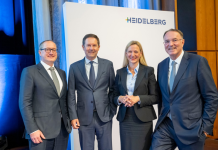
Yesterday afternoon (28 July 2020), we had a telephone conversation with Ferdinand Rueesch, the anchor shareholder and member of the Supervisory Board of Heidelberg and Thomas Fichtl, the head of Corporate Public Relations and press officer at Heidelberg. As most industry mavens know, Rueesch sold his remaining majority shares in Gallus to Heidelberg in 2014 in exchange for Heidelberg shares that make him, with approximately 9% of the shareholding, the largest individual stakeholder in the company. He became, from that time, what is described as an ‘anchor shareholder.’
As a member of the Heidelberg board, he maintained his deep links with the label industry in a role that looked after key Gallus Group accounts. The Gallus Group holding has just been acquired by benpac, a family-owned Swiss company. Rueesch will remain on the board of Heidelberg and as an anchor shareholder. With Gallus, he will be responsible for the key accounts as before. We asked Fichtl and Ruesch when the deal will close and when Heidelberg expects to get the Euro 120 million from benpac. Fichtl replied that all the formalities should be completed, and the money should come by Q3 or the end of the 2020 calendar year.
Benpac’s resources key for Gallus developments
Like many who know Rueesch’s style of visiting customers worldwide and looking at their Gallus label and wide-web flexo presses (used for a variety of applications including security printing and liquid packaging), we were curious. What does the divestment mean for both Heidelberg and benpac and the future of the Gallus Group? Ruesch and Fichtl assured us that the divestiture of the Gallus Group, is positive for all concerned, explaining, “It is an opportunity for benpac which has the financial resources to invest in Gallus and the development of the Gallus portfolio. It is a win-win for both as Heidelberg gains economically, as it currently needs to maximize its liquidity.”
Benpac produces filling machines, cappers, labeling solutions, plastic injection molding technology, and paper-based packaging machinery technology. Last year, the group took over one of Müller-Martini’s operations in Stans to use this centrally located site as a base for some of its activities in Switzerland. At the same time, the group, with some 3150 employees in Europe and the Americas, took over Packsys Global in Thailand. Renamed benpac packaging, the Thai plant specializes in high-speed aerosol tube production and filling lines.
Cash is king
As with other German engineering companies that rely on global exports, sales are estimated by the industry’s association to decrease because of the Covid-19 pandemic, from 30 to 50% this year. Fichtl said one could expect Heidelberg sales to decline by perhaps as much as 30%. “As they say in such times, cash is king. However, keep in mind that the transformation plan of Heidelberg began before the Coronavirus pandemic.”

Heidelberg will continue to sell and service the Gallus presses and supply Gallus with the digital systems that go into the Gallus Labelfire digital press. The Labelfire is said to have about 40 installations worldwide, and Heidelberg will continue to support its development, although it has stopped producing its B1 sheetfed digital press.
The main plan is for Heidelberg to stick to the core market of sheetfed offset that it still dominates in terms of market share and with a footprint of more than 5,000 machines around the world. Over 50% of this footprint is used for printing monocartons.
We asked about the nature of Heidelberg’s investment in printed electronics and organics that was also announced last week, preceding the Gallus Group sale announcement. Fichtl clarified that this was a project several partners initiated with the German government’s support in 2008. “It has fructified over ten years with the InnovationLab and Heidelberg deciding to become a manufacturer of printed electronics and organics and not as a seller of technology.”
Our customers must be successful for themselves
We asked Rueesch about what the forthcoming Gallus Group developments might be with benpac in control. He said that although cooperative discussions have begun, “It is too early to answer, and the work of evaluating the portfolio will happen in the coming weeks.
When asked about what he has learned in his time at Heidelberg, Rueesch said, “One has to understand that the label industry has its own language just as the folding carton industry has its language. It is important not just to know your machine but the customers and their applications. We have to make the customers successful for themselves, and we need to understand the domains in which they operate, in deep detail. And the shortest and most direct line for their success must be contained in our answers for them.”
The headline and tagline of this article have been exchanged on 30 January 2021.










